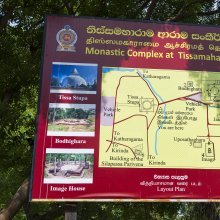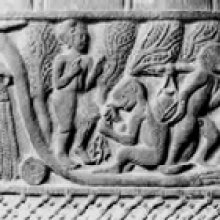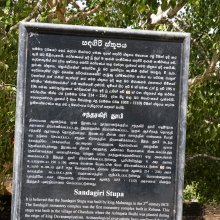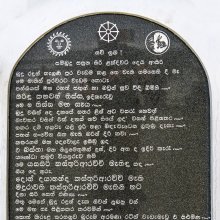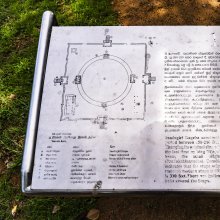Arama, Ārāma: 21 definitions
Introduction:
Arama means something in Buddhism, Pali, Hinduism, Sanskrit, the history of ancient India, Marathi, Jainism, Prakrit, Hindi. If you want to know the exact meaning, history, etymology or English translation of this term then check out the descriptions on this page. Add your comment or reference to a book if you want to contribute to this summary article.
Alternative spellings of this word include Aaram.
Images (photo gallery)
(+3 more images available)
In Hinduism
Purana and Itihasa (epic history)
Source: Cologne Digital Sanskrit Dictionaries: The Purana IndexĀrāma (आराम).—Laying out parks at the auspicious hour—also udyāna;1 in Tripuram;2 punishment for misuse of.3

The Purana (पुराण, purāṇas) refers to Sanskrit literature preserving ancient India’s vast cultural history, including historical legends, religious ceremonies, various arts and sciences. The eighteen mahapuranas total over 400,000 shlokas (metrical couplets) and date to at least several centuries BCE.
In Buddhism
Mahayana (major branch of Buddhism)
Source: Wisdom Library: Maha Prajnaparamita SastraĀrāma (आराम) refers to “(gifts of) gardens”, according to Mahāprajñāpāramitāśāstra (chapter 19).—Accordingly, “Furthermore, the reward (vipāka) attributed to generosity increases in the following cases:—[...] When one gives gardens (ārāma), pools (hrada), etc., to the good people of the monasteries (vihāra). When one gives to the Community (saṃgha). [...]”.
Source: academia.edu: A Study and Translation of the GaganagañjaparipṛcchāĀrāma (आराम) refers to the “delights (of the dharma)”, according to the Gaganagañjaparipṛcchā: the eighth chapter of the Mahāsaṃnipāta (a collection of Mahāyāna Buddhist Sūtras).—Accordingly, “How then, son of good family, does the Bodhisattva who has attained memory never forget? Son of good family, the Bodhisattva attains memory (dhāraṇī) by purifying his memory. What then is the purification of memory? Son of good family, there are thirty-two purifications of memory. What are the thirty-two? To wit, (1) seeking the dharma; (2) delight in the dharma; (3) taking pleasure in the delights of the dharma (dharma-ārāma-ratiratatā); (4) inclination towards the dharma; [...]”
Source: De Gruyter: A Buddhist Ritual Manual on AgricultureĀrāma (आराम) refers to a “garden” (suitable for an offering ritual), according to the Vajratuṇḍasamayakalparāja, an ancient Buddhist ritual manual on agriculture from the 5th-century (or earlier), containing various instructions for the Sangha to provide agriculture-related services to laypeople including rain-making, weather control and crop protection.—Accordingly, [As the Bhagavān said]: “Now I shall teach the offering manual which is auspicious and can bring about any effect. [...] This dhāraṇī should be written down and mounted at the top of a flagstaff in the four corners of the maṇḍala. These should be placed in the middle of the field. These should be placed in the middle of the garden (ārāma-madhya). Immediately after these have been placed, the great mountain slope sealing of the boundary is completely established in the four directions. [...]”.

Mahayana (महायान, mahāyāna) is a major branch of Buddhism focusing on the path of a Bodhisattva (spiritual aspirants/ enlightened beings). Extant literature is vast and primarely composed in the Sanskrit language. There are many sūtras of which some of the earliest are the various Prajñāpāramitā sūtras.
India history and geography
Source: Cologne Digital Sanskrit Dictionaries: Indian Epigraphical GlossaryĀrāma.—(LL), a park. (ML), a grove or monastery. Note: ārāma is defined in the “Indian epigraphical glossary” as it can be found on ancient inscriptions commonly written in Sanskrit, Prakrit or Dravidian languages.

The history of India traces the identification of countries, villages, towns and other regions of India, as well as mythology, zoology, royal dynasties, rulers, tribes, local festivities and traditions and regional languages. Ancient India enjoyed religious freedom and encourages the path of Dharma, a concept common to Buddhism, Hinduism, and Jainism.
Languages of India and abroad
Pali-English dictionary
Source: BuddhaSasana: Concise Pali-English Dictionaryārāma : (m.) 1. pleasure; delight; 2. a park; 3. a monastery.
Source: Sutta: The Pali Text Society's Pali-English DictionaryĀrāma, (Sk. ārāma, ā + ram) — 1. pleasure, fondness of (-°), delight, always as adj. (-°) delighting in, enjoying, finding pleasure in (usually combd. with rata, e.g. dhammārāma dhammarata finding delight in the Dh.) S. I, 235; IV, 389 sq. (bhav°, upādān°); A. I, 35, 37, 130; II, 28 (bhāvan°); It. 82 (dhamm°); Sn. 327 (id. ; expld. by SnA 333 as rati and “dhamme ārāmo assā ti”); Pug. 53 (samagg°); Vbh. 351.—2. a pleasure-ground, park, garden (lit. sport, sporting); classified at Vin. III, 49 as pupph° and phal° a park with flowers or with fruit (i.e. orchard), def. at DhA. III, 246 as Veḷuvana-Jīvak’ambavan’ādayo, i.e. the park of Veḷuvana, or the park belonging to Jīvaka or mango-groves in general. Therefore: (a) (in general) a park, resort for pastime etc. Vin. II, 109; D. II, 106; Dh. 188; Vv 795 (amb° garden of mangoes); VvA. 305 (id.); Pv. II, 78 (pl. ārāmāni = ārām’ûpavanāni PvA. 102).—(b) (in special) a private park, given to the Buddha or the Saṅgha for the benefit of the bhikkhus, where they meet & hold discussions about sacred & secular matters; a place of recreation and meditation, a meeting place for religious gatherings. Amongst the many ārāmas given to the bhikkhus the most renowned is that of Anāthapiṇḍika (Jetavana; see J. I, 92—94) D. I, 178; Vin. IV, 69; others more frequently mentioned are e.g. the park of Ambapālī (Vin. I, 233); of Mallikā (D. I, 178), etc.—Vin. I, 39, 140, 283, 291; II, 170; III, 6, 45, 162; IV, 85; A. II, 176; Dpvs. V, 18.

Pali is the language of the Tipiṭaka, which is the sacred canon of Theravāda Buddhism and contains much of the Buddha’s speech. Closeley related to Sanskrit, both languages are used interchangeably between religions.
Marathi-English dictionary
Source: DDSA: The Molesworth Marathi and English Dictionaryarāma (अराम).—Preferably ārāma. &c.
--- OR ---
ārāma (आराम).—m ( P) Rest, repose; resting, reposing. v kara. 2 Ease, relief, remission of pain or sickness. 3 Used wrongly as adj That is at ease or in rest or composure.
--- OR ---
ārāma (आराम).—m S A pleasure ground; a garden, a park &c.
Source: DDSA: The Aryabhusan school dictionary, Marathi-Englishārāma (आराम).—m Rest; ease. Remission of pain. A garden.
Marathi is an Indo-European language having over 70 million native speakers people in (predominantly) Maharashtra India. Marathi, like many other Indo-Aryan languages, evolved from early forms of Prakrit, which itself is a subset of Sanskrit, one of the most ancient languages of the world.
Sanskrit dictionary
Source: DDSA: The practical Sanskrit-English dictionaryArama (अरम).—a. Low, vile.
--- OR ---
Arāma (अराम).—a. Disagreeable, unpopular; एवं प्रव्राजितश्चैव रामोऽरामो भविष्यति (evaṃ pravrājitaścaiva rāmo'rāmo bhaviṣyati). Rām.2.9.33.
--- OR ---
Ārāma (आराम).—a. [ram-ghañ] Pleasing, delightful; रामभद्र गुणाराम (rāmabhadra guṇārāma) Mv.7.4.
-maḥ 1 Delight, pleasure; इन्द्रियारामः (indriyārāmaḥ) Bhagavadgītā (Bombay) 3.16; आत्मारामाः (ātmārāmāḥ) Ve.1.31; एकाराम (ekārāma) Y.3.58.
2) A garden, grove; प्रियारामा हि वैदेह्यासीत् (priyārāmā hi vaidehyāsīt) Uttararāmacarita 2; आरामाधिपतिर्विवेकविकलः (ārāmādhipatirvivekavikalaḥ) Bv.1.31. आरामः कल्पवृक्षाणाम् (ārāmaḥ kalpavṛkṣāṇām) (rāmarakṣā) [cf. Pers. ārām].
Source: Cologne Digital Sanskrit Dictionaries: Shabda-Sagara Sanskrit-English DictionaryArama (अरम).—mfn.
(-maḥ-mā-maṃ) Low, inferior See avama
--- OR ---
Arāma (अराम).—mfn.
(-gaḥ-gā-gaṃ) Cool, unimpassioned. E. a neg. rāga passion.
--- OR ---
Ārāma (आराम).—m.
(-maḥ) A garden, a grove. E. āṅ before ram to please, ghañ aff.
Source: Cologne Digital Sanskrit Dictionaries: Benfey Sanskrit-English DictionaryĀrāma (आराम).—i. e. ā-ram + a, m. 1. Pleasure, [Bhagavadgītā, (ed. Schlegel.)] 3, 16. 2. A garden, [Daśakumāracarita] in
Ārāma (आराम).—[masculine] pleasure, pleasure-garden.
Source: Cologne Digital Sanskrit Dictionaries: Monier-Williams Sanskrit-English Dictionary1) Ārāma (आराम):—[=ā-rāma] [from ā-ram] m. delight, pleasure, [Śatapatha-brāhmaṇa; Taittirīya-upaniṣad; Bhagavad-gītā; Bhartṛhari]
2) [v.s. ...] place of pleasure, a garden, grove, [Manu-smṛti; Yājñavalkya; Mahābhārata; Rāmāyaṇa; Mṛcchakaṭikā; Kathāsaritsāgara etc.]
3) [v.s. ...] Name of a particular Daṇḍaka metre
4) [v.s. ...] (cf. ἠρέμα and ἔρημος.)
Source: Cologne Digital Sanskrit Dictionaries: Yates Sanskrit-English Dictionary1) Arama (अरम):—[a-rama] (maḥ-mā-maṃ) a. Low.
2) Ārāma (आराम):—[ā-rāma] (maḥ) 1. m. A garden, grove.
Source: DDSA: Paia-sadda-mahannavo; a comprehensive Prakrit Hindi dictionary (S)Ārāma (आराम) in the Sanskrit language is related to the Prakrit word: Ārāma.
[Sanskrit to German]
Sanskrit, also spelled संस्कृतम् (saṃskṛtam), is an ancient language of India commonly seen as the grandmother of the Indo-European language family (even English!). Closely allied with Prakrit and Pali, Sanskrit is more exhaustive in both grammar and terms and has the most extensive collection of literature in the world, greatly surpassing its sister-languages Greek and Latin.
Hindi dictionary
Source: DDSA: A practical Hindi-English dictionaryĀrāma (आराम) [Also spelled aaram]:—(nm) rest; comfort; relief; ~[kursī] an easy chair; ~[gāha] resting place; rest station; ~[deha] comfortable; ~[pasaṃda] easy-going;—[karanā] to rest; to cure (of an illness); —[pharamānā] to be resting/taking rest (said deferentially). —[se] slowly; gently; at leisure.
...
Prakrit-English dictionary
Source: DDSA: Paia-sadda-mahannavo; a comprehensive Prakrit Hindi dictionary1) Ārāma (आराम) in the Prakrit language is related to the Sanskrit word: Ārāma.
2) Ārāma (आराम) also relates to the Sanskrit word: Ārāma.
Prakrit is an ancient language closely associated with both Pali and Sanskrit. Jain literature is often composed in this language or sub-dialects, such as the Agamas and their commentaries which are written in Ardhamagadhi and Maharashtri Prakrit. The earliest extant texts can be dated to as early as the 4th century BCE although core portions might be older.
Kannada-English dictionary
Source: Alar: Kannada-English corpusArama (ಅರಮ):—[noun] an ophthalmic disease.
--- OR ---
Ārāma (ಆರಾಮ):—
1) [noun] that which is delightful.
2) [noun] the state of being delighted; delight; pleasure.
3) [noun] a pleasuregarden or grove.
4) [noun] the tree Ficus tomentosa of Moraceae family.
--- OR ---
Ārāma (ಆರಾಮ):—
1) [noun] a reposing inactively; repose; rest.
2) [noun] freedom from disease; good health.
3) [noun] freedom from disturbance.
4) [noun] ಆರಾಮವಾಗಿ [aramavagi] ārāmavāgi, in a manner characterised by or having leisure; without haste; slowly; unhurriedly; leisurely; 2. without having mental tension or strain; tautless.
Kannada is a Dravidian language (as opposed to the Indo-European language family) mainly spoken in the southwestern region of India.
See also (Relevant definitions)
Starts with (+50): Arama Sutta, Arama Vagga, Arama-birama, Arama-garnu, Aramacetiya, Aramadala, Aramadalu, Aramadanda, Aramadayaka, Aramadayi, Aramadhipati, Aramadipratishthapaddhati, Aramadusaka Jataka, Aramaga, Aramagal, Aramagriha, Aramai, Aramaicceti, Aramaicoramai, Aramaintan.
Ends with (+278): Abhitarama, Abhyantararama, Acarama, Acharama, Adhyarama, Adikarama, Adityarama, Advaitarama, Agarama, Aishaarama, Aisharama, Ambarama, Anandarama, Anantarama, Anathapindikassarama, Aniharama, Anomarama, Antararama, Anuparama, Anurarama.
Full-text (+108): Antararama, Griharama, Aramika, Aramam, Aramashitala, Aramaparigraha, Kukkutarama, Aramu, Ekaramata, Jetarama, Atmaramayogendra, Aramadhipati, Aramavatthu, Arama-birama, Kanyarama, Ropa, Aramaropa, Aramatha, Ramashitala, Ganarama.
Relevant text
Search found 41 books and stories containing Arama, Ārāma, Arāma, A-rama, Ā-rāma; (plurals include: Aramas, Ārāmas, Arāmas, ramas, rāmas). You can also click to the full overview containing English textual excerpts. Below are direct links for the most relevant articles:
Bihar and Eastern Uttar Pradesh (early history) (by Prakash Narayan)
The Sangha < [Chapter 3 - Religious Beliefs, Institutions and Practices: New Perspectives]
Settlement in Early Historic Ganga Plain (by Chirantani Das)
Part 4 - From Arama to Vihara < [Chapter III - Nālandā: Evidence for rise and progress of the settlement]
Shrimad Bhagavad-gita (by Narayana Gosvami)
Verse 5.24 < [Chapter 5 - Karma-sannyāsa-yoga (Yoga through Renunciation of Action)]
Verse 3.16 < [Chapter 3 - Karma-yoga (Yoga through the Path of Action)]
Buddhist Education in Thailand (critical study) (by Smitthai Aphiwatamonkul)
5. Sangha’s Administration in Thailand < [Chapter 2 - The Thai Sangha System of Education]
Rig Veda (translation and commentary) (by H. H. Wilson)
Vinaya (3): The Cullavagga (by T. W. Rhys Davids)
Cullavagga, Khandaka 5, Chapter 35 < [Khandaka 5 - On the Daily Life of the Bhikkhus]
Cullavagga, Khandaka 5, Chapter 23 < [Khandaka 5 - On the Daily Life of the Bhikkhus]
Cullavagga, Khandaka 5, Chapter 17 < [Khandaka 5 - On the Daily Life of the Bhikkhus]

